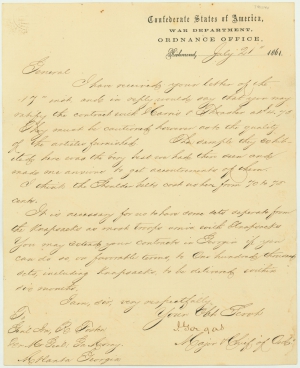On the Day of the First Battle of Bull Run,
Confederate Ordnance Chief Josiah Gorgas Orders
Equipment for 100,000 Troops |
Click to enlarge:

JOSIAH GORGAS. [BULL RUN].
Manuscript Letter Signed, to Ira R. Foster. Richmond, Va., July 21, 1861. 1 p., 8 x 9¾ in.
Inventory #22393
Price: $1,950
Complete Transcript
General
I have received your Letter of the 17” inst, and in reply would say that you may ratify the contract with Harris & Thrasher at $4.75. They must be cautioned however as to the quality of the articles furnished. The sample they exhibited here was the very best we had seen and made me anxious to get accoutrements of them.
I think the Shoulder belts cost us here from 70 to 75 cents.
It is necessary for us to have some sets separate from the Knapsacks as most troops arrive with Knapsacks. You may extend your contracts in Georgia if you can do so, on favorable terms, to One hundred thousand sets, including Knapsacks, to be delivered within six months.
I am, sir, very respectfully,/ Your Obt Serv
J. Gorgas/ Major & Chief or Ords
To Gen’l Ira, R. Foster
Qr Mr Gen’l; Ga Army.
Atlanta Georgia
On verso: In Reference to Thrashers Contract
Historical Background
Josiah Gorgas (1818 – 1883) was born in Pennsylvania. He entered West Point in 1837 and graduated sixth in his class four years later. He was commissioned a second lieutenant of ordnance and served at the Watervliet (N.Y.) and Detroit arsenals. Gorgas served in the Mexican War under General Winfield Scott. He was transferred to Mobile, Alabama, where he met Amelia Gayle, the sister of the arsenal’s surgeon and daughter of a former Alabama governor. Her family played a major role in his political and social thought, but he resigned his commission in the regular army as much for personal feelings as political leanings. While friends encouraged him, his wife recommended against joining the Confederate army. His final decision to join marked a permanent break with his family in Pennsylvania.
On General P.G.T. Beauregard’s recommendation, Jefferson Davis appointed Gorgas Chief of Ordnance, although he was the only ordnance officer available to the Confederacy at the time. He set to work to rectify the huge disparity of arms and industrial production in the South. At the beginning of the war, 90% of the South’s arms were imported. Gorgas’s programs to build armories, iron foundries, and powder works, along with railroad improvements, general salvage and resource recovery allowed the South to literally turn “plowshares into swords.” By 1863, the South was self-sufficient in military hardware. After the war, Gorgas served briefly as president of the University of Alabama.
Condition
Fine
Sources
“Josiah Gorgas (1818 – 1883).” http://www.encyclopediavirginia.org/Gorgas_Josiah_1818-1883
Frank E. Vandiver, Ploughshares into Swords: Josiah Gorgas and Confederate Ordnance (Texas A&M University Press, 1994)